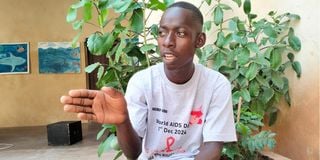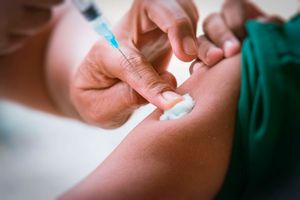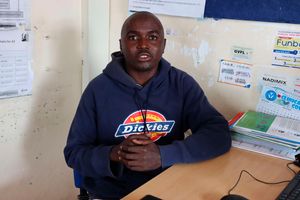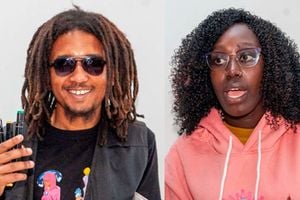
Wesley Baraka Baya, a resident of Sabasaba in Hindi, Lamu West, during the interview with the Nation on Monday, December 2 ,2024
“I was born HIV positive but I knew about my status and what that means when I was seven years old. The revelation of being HIV positive shaped my life immediately. I wasn’t bitter with my parents but later accepted my medical condition. I am now 18 years and the future looks bright.”
These are the words of Wesley Baraka Baya.
The 18-year-old teenager, a resident of Sabasaba, a remote village in Hindi Division of Lamu West, is a vocal champion for people living with HIV and Aids in Lamu County.
Despite his tender age, Baraka has been very active in helping HIV-positive people across the coastal county to overcome despair, hopelessness and stigma.
His hopes have always been that all men, women and children with HIV in Kenya and the world as a whole, can one day just lead a normal life without the worries of being degraded and looked down on.
During an interview with Nation.Africa, Baraka revealed that he started living with HIV and Aids in 2006, the year he was born.
By then, both of his parents were HIV positive.
His father, Peter Baya Wanje, an Administration Police (AP) officer, died in 2008, and his mother, Nancy Auma Owira, 39, has raised Baraka and his other two siblings as a single parent since then.
Baraka is the second born in a family of three.
HIV positive
Growing up, Baraka would adhere to his mother’s instructions requiring him to religiously swallow certain tablets daily.
“When I was seven years old, I had to ask my mother why I was taking medication daily and I wasn’t sick. Sometimes she would ensure I accompany her to clinics in one of the health centres within Hindi. That raised my suspicion even more. When she saw I was too inquisitive, she woke up one day, sat me in one of the corners of our compound at home and broke the bombshell to me,” said Baraka.
He added, “My mum explained it to me so well that both my late father and her were HIV positive and that I was born with the same status. But she quickly told me, son, HIV is not a death sentence. After a brief explanation and a word of encouragement from her, I fully accepted my medical condition.”
Baraka says from then on, he decided to pursue life positively with the full knowledge that HIV is just part of his life and needed to accept it and always feel good about himself.
But he admits that living with HIV and Aids in society is not so easy.
As a high school student, joining Form 4 next year, Baraka says in the various institutions he has so far attended, he has been discriminated against, especially by teachers who happened to know about his status.
According to Baraka, some teachers would tell fellow students to stop befriending him since he was HIV-positive.
In other instances, he said teachers would go to the extent of caning his colleagues just to ensure they avoid ties with him, a situation he says used to hurt him, especially during childhood.
Through the experience he has had so far as a person living with HIV, Baraka says the disease does not actually kill people directly but instead causes a deficiency in the immune system.
Mentally balanced
On the other hand, he says stigma may kill directly and urges society to accommodate and love people living with HIV.
“Stigma is the number one killer for HIV-positive individuals. That’s why, as a victim, you need to make choices well. I advise people like me to love, live well and enjoy your body as an HIV-positive person, free from stigma and discrimination,” said Baraka.
But what does it look and feel like in your everyday life? We asked Baraka.
He says being happy, with no judgments from people and being able to stay in class, learn and live harmoniously with others in society feels great.
He says he always keeps his mind and body mentally balanced.
“Despite certain times where I am forced to stay off class due to sickness, though rarely, I have always ensured I take my HIV medication as well as complementary therapies religiously. Attending and keeping up to date with all my medical appointments has indeed vitally proved necessary for me,” said Baraka.
As he completes Form 4 next year, Baraka, since childhood, aspires to serve in the Kenya Defence Forces (KDF).
His major worry has, however, been that he is HIV positive and joining the military with such an underlying medical condition may be difficult, nearly impossible.
Many times recruits across the country have been turned down during recruitment after undergoing various tests and found to have health conditions that make them unfit to join the KDF.
But Baraka is pleading with the state to make reforms that will see to it that HIV and Aids persons get accepted to join the forces.
Medication
He is aware that persons diagnosed early with HIV, take their medication regularly and who have access to medical care like him can live long and fulfilling lives.
“It’s my prayer that KDF will accept me despite living with this medical condition. I will feel my life is fulfilled if I become a KDF soldier. And that’s why I beg for reforms to be made in the KDF to enable HIV-positive patients to join the military...and if that happens, it will make my life dream finally come true,” said Baraka.
As he enters adulthood, Baraka also hopes that one day, an understanding and loving partner will show up so that he can start a family, bringing forth children that he vows to ensure all of them are HIV-negative.
“I pray that I’ll meet someone so that we can feel connected, support each other and raise children together. I don’t think it is right for us, HIV-positive people, to deny ourselves the right to have fulfilling and happy intimate relationships. We all deserve love and pleasure. When that right time comes, I’ll ensure our children are born and raised with an HIV-negative status,” he said.
Baraka’s mother Nancy Auma Owira, admits that it was not an easy task raising his son with the HIV positive status.
Ms Auma says the firstborn, a daughter, is HIV negative while the last born child, also a daughter, is HIV negative, as well.
“It was so depressing to find out that I was HIV positive shortly after giving birth to Baraka. In fact, the birth of Baraka is the one that made me know my HIV status. My son and I were recurrently sick and we had to be on and off hospitals. That’s when we were put through a series of tests and found out that we were HIV positive. My husband died just a year and a half after Baraka was born,” said Ms Auma.
Sole breadwinner
Life became extremely difficult after the death of her husband since he was the sole breadwinner of the family now that Ms Auma was just a housewife by then.
Today, Ms Auma works as a Community Health Promoter and a Peer Champion and Treatment Literacy Facilitator among HIV-positive people in Lamu County.
She has always advised his son and other people living with HIV to ensure their everyday life is just eating well, taking medication correctly and being happy with who they are.
Ms Auma expects HIV-positive people will embrace happiness to enable them to live well and long.
She also hopes that there will be a cure in the near future and that HIV treatments will be available for everyone who needs it.
Her wish has also been that one day the disease will be eliminated in the world.
She advises HIV-positive individuals to just keep being themselves as there is no shame in what their status is. She insists on them to make sure they take their medications daily, eat healthy and follow up on their clinics religiously.
They should also love themselves and forget the negative.
“I have lived to be my son’s number one support system. I always encourage him and others on their journey with HIV. I try to show them daily that just because we’ve HIV doesn’t mean HIV has us. Love yourselves and don’t listen to others who are negative,” said Ms Auma.
She is also pleading with donors to come out and assist families affected with HIV in Lamu, adding that many are poor and cannot even manage a meal.
“We need donors to intervene. As for me, my son is in Form 4 next year and I have no fees. My firstborn sat the Kenya Certificate of Secondary Education exams this year and has fee arrears amounting to Sh11,000. I beg for support. The journey is rocky,” said Ms Auma.









